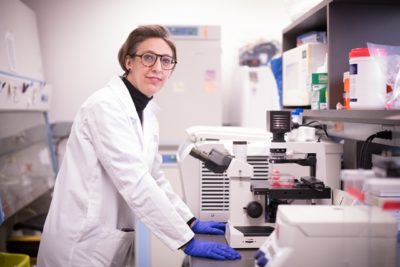By Dr. Samira Mubareka
On January 24th, Sunnybrook Health Sciences admitted the first Canadian patient with COVID-19. The traveller had just returned from Wuhan, China, the epicentre of the virus outbreak. He presented with a respiratory illness due to SARS-CoV-2, the coronavirus that causes COVID-19. At that moment I realized this virus would come to dominate our reality, both at Sunnybrook and across Canada.
I also understood that we needed to move quickly to understand this highly unpredictable virus that had landed on our doorstep, after spilling over to humans from an unknown source and gaining a global foothold. Within six weeks of our first case, in partnership with colleagues at McMaster University, we had isolated the virus from a clinical sample in a high-containment University of Toronto laboratory.
Within a week of culturing the virus, we had sequenced the whole genome of our SARS-CoV-2 isolated at Sunnybrook. Sequencing helps us understand how the virus is moving, changing, and being transmitted across the country. It is also critical to pinpointing where the importations come from, and at what point the virus starts spreading locally. The cornerstone for this is good public health and contact-tracing, for which sequencing provides important insights.
The need for larger-scale sequencing efforts of SARS-CoV-2 was obvious early on. Sequencing is not usually done at the hospital level, though early adopters such as Sunnybrook are able to sequence 50-100 virus samples per week. As the case counts outran us, a provincial, as well as a national, coordinated response was sorely needed. Without this, we were going to remain blind to how the virus was moving around Ontario and Canada.
A $40 million investment by the Government of Canada in late April established CanCOGeN (Canadian COVID Genomics Network), an open, collaborative sequencing initiative to coordinate data sharing and analysis across Canada and with international colleagues. Led by Genome Canada, CanCOGeN brings together the National Microbiology Lab, provincial public health labs, hospitals, universities, the six regional Genome Centres, the private sector, and CGEn (national platform for sequencing and analysis).

CanCOGeN supports two key projects. The first will sequence up to 150,000 viral samples from people testing positive for COVID-19. Studying the genome of the virus and collectively developing and standardizing lab tools to analyze its traits across Canada will provide critical information for our public health response. The streamlining of guidelines, protocols, and data quality will strengthen and accelerate the response.
The second project will sequence the genomes of up to 10,000 patients diagnosed with COVID-19 (the “hosts”). The number one question that colleagues ask me in the hallways at Sunnybrook Hospital is why there are so many differences (and anomalies) in patient outcomes. Here in Canada, despite the lethality of the virus in our senior population overall, we have seen some elderly patients do exceptionally well and extremely serious symptoms among young healthy people.
I am hopeful that by sequencing the genomes of thousands of COVID-19 positive patients we will understand the host genome in the context of viral infection and severity of disease. That will help drive a precision medicine approach during the next waves of COVID-19. Doctors and researchers will be able to more accurately predict which treatment and prevention strategies will work on which groups of people, allowing for individually tailored treatments based on genetic profile.
CanCOGeN will also investigate if and how a virus reinfection can be distinguished from a relapse due to the primary infection. If we sequence the virus collected from a patient during the first infection and compare it to one collected from that same patient during the second infection and they are the same, it is probably a relapse. If they are different, it may be a reinfection.
A virus does not respect borders. That’s why sharing quality data across Canada and internationally is crucial. In addition to depositing the sequence data and associated patient data in global public databases, CanCOGeN is collaborating with the COVID-19 Genomics UK consortium and pursuing similar agreements with other countries. These partnerships will allow us to share insights and discoveries to drive understanding of the pandemic as it changes over time. Global Alliance for Genomics and Health standards will govern the responsible and secure sharing of all data.
We are already seeing the results of this coordinated open approach, with improvements in virus tracking, as well as progress in development of antivirals and vaccines. Genomics has also provided us with a glimpse of where this virus may have come from.
But we must not lose sight of the bigger picture. As SARS-CoV-2 circulates among humans — one of the most abundant species on earth — we risk infecting other species. This may both threaten their health and create new viral reservoirs that may spill over back into humans. We urgently need genomic information on animals in Canada.
Genomics can also help in surveillance, in anticipation of further waves of COVID-19. Establishing a national capacity now, while optimizing provincial coordination, means we can build sustainability by continuing to sequence in real time as more cases arise. Maintaining this capacity and infrastructure, and carrying on with basic research, will allow us to be less reactive in the future. We simply cannot afford to get complacent in that period before the next pandemic strikes. Our future responses will be more rapid and effective if we can pivot nimbly to a new virus within an established framework, and with proven tools and networks.
What has heartened me and kept me going is the incredible openness and collaboration that I have witnessed at Sunnybrook Health Sciences, in our Ontario institutions, and across Canada’s research, public health, and health care ecosystem.
Thank you to all the nurses and physicians for your clinical care of patients, to Infection Prevention and Control practitioners for keeping us safe, and to technicians, students, and post-docs at the bench for keeping us smart. I have never seen people rally together like this. We must carry forward this new reality so that we are resilient and prepared in the future.
Dr. Samira Mubareka is an Infectious Diseases Physician & Virologist – Sunnybrook Health Sciences Centre & Research Institute and the University of Toronto.


